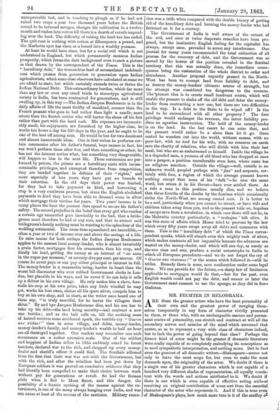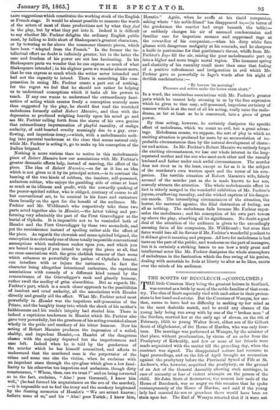MR. FECHTER IN MELODRAMA..
ARE those the greater actors who have the least personality of their own and the greatest power of merging them- selves temporarily in any form of character vividly presented to them, or those who, with an unchangeable essence and perma- nent centre of personality, can stretch and contract at will all the secondary nerves and muscles of the mind which surround that centre, so as to represent a very wide class of characters indeed, but to lack the power of going beyond that class? Perhaps the former kind of actor might be the greater if dramatic literature were really capable of so completely embodying its conceptions as to need sympathetic interpretation, and nothing more. But in fact even the greatest of all dramatic writers—Shakespeare----seems not only to leave the most scope for, but even to make the most demands upon, the originality of the actor. We doubt if there is a single one of his greater characters which is not capable of a hundred very different shades of representation, all equally consis- tent with the words and actions attributed to it. We doubt if there is one which is even capable of effective acting without receiving an original contribution of some sort from the essential character of the actor who represents it. And if this is true even of Shakespeare's plays, how much more true is it of the medley of mere suggestions which constitutes the working stock of the English or French stage. It would be almost possible to measure the worth of the actors of most of these productions not by what they find in the play, but by what they put into it. Indeed it is difficult to say whether Mr. Fechter delights the ordinary English public most, by falling so little short of Shakespeare's greatest characters, or by towering so far above the commoner theatric pieces, which have been " adapted from the French." In the former the in- tellectual effort no doubt is infinitely greater, but in the latter the ease and freedom of his power are not less fascinating. In his Shakespeare parts we wonder that he can express so much of what Shakespeare intended ; in his slighter parts we wonder almost more, that he can express so much which the writer never intended and had not the capacity to intend. There is something like com- pensation in seeing Mr. Fechter create a part out of nothing, for the regret we feel that he should not rather be helping us to understand conceptions which it tasks all his powers to reach. If any one wants to understand the extraordinary fasci- nation of acting which creates freely a conception scarcely more than suggested by the play, he should first read the wretched melodrama formerly called Robert Macaire, and then with the depression so produced weighing heavily upon his mind go and see Mr. Fechter calling forth from the stores of his own genius that extraordinary impersonation of playful rascality, of malign audacity, of cold-hearted cruelty seemingly due to a gay, over- flowing, and imperious irony,—which, with a melodramatic melt- ing into parental tenderness at the close that seems natural only while Mr. Fechter is acting it, go to make up his conception of the Italian brigand.
Nothing is more curious than to notice in this melodramatic piece of Robert Macaire how our associations with Mr. Fechter's greater dramatic efforts help, instead of marring, the effect of the piece. The idea of Robert Macaire,—so far as it has an idea which is not given to it by its principal actors,—is to contrast the bearing of the two kinds of robbers, the insolent, self-possessed, audacious robber, who enjoys the gambling side of crime at least as much as its idleness and profit, with the cowardly quaking of the poorer-spirited robber, who is obliged, contrary of course to all but conventional art, to be comical in his fears and caricature them broadly on the spot for the benefit of the audience. Mr. Fechter and Mr. Widdicomb who respectively take these two parts acted together also in Hamlet,—the latter taking and per- forming very admirably the part of the First Gravedigger at the burial of Ophelia. It is impossible not to be reminded both of Hamlet and the First Gravedigger by these two scoundrels, and yet the reminiscence instead of spoiling rather aids the effect of the piece. As regards the clownish and mean-spirited brigand, the conception is so obviously one of those totally impossible conventional assumptions which melodrama makes upon you, and which you are bound to accept if you intend to enjoy the piece at all, that no cross-associations with the grim cloddish humour of that scene which enhances so powerfully the pathos of Ophelia's funeral, can interfere with or injure the caricature. In fact the -character being altogether intentional caricature, the capricious associations with comedy of a different kind caused by the remembrance of the Gravedigger's rank and ghastly humour, rather swell the medley of grim absurdities. But as regards Mr. Fechter's part, which is a much closer approach to the possibilities of insolent and cruel audacity, all the associations with Hamlet directly and greatly aid the effect. What Mr. Fechter acted most powerfully in Hamlet was the imperious self-possession of the Prince, and the haughty irony into which the shock of his mother's faithlessness and his uncle's iniquity had steeled him. There is indeed a capricious tenderness in Hamlet which Mr. Fechter also gave very powerfully, but the greatness of his acting consisted almost wholly in the pride and mockery of his bitter humour. Now his acting of Robert Macaire produces the impression of a soiled, shabby, and impudent Hamlet,—a Hamlet of the dangerous classes with the majesty departed but the imperiousness and -ease left. Indeed when he is told by the gendarmes of the murder which he has himself committed, and affects to understand that the murdered man is the perpetrator of the crime and some one else the victim, when he exclaims with an impudent stare through the eye-glass which gives a low fami- liarity to his otherwise too imperious and audacious, though dirty countenance, " Whom, then, can we trust ?" and on being corrected as to the fact, exclaims, "Alas I poor Germeuil, I knew him well," (he had formed his acquaintance on the eve of the murder), —it is impossible not to feel the irony and the mockery heightened by the floating memories of Hamlet's " We are arrant knaves ; believe none of us," and his " Alas poor Yorick ; I knew him, Horatio." Again, when he scoffs at his timid companion, asking where " his noble friend" has disappeared to,—(in terror of the gendarmes the convict had crept beneath the table)— or suddenly changes his air of assumed condescension and familiar ease for imperious menace and suppressed rage at the cowardice of his companion,—when his dirty white face gleams with dangerous malignity at his comrade, and he sharpens a knife in pantomime for that gentleman's throat, whiffs from Mr. Fechter's Iago fill the air, raising the poor melodramatic part up into a higher and more tragic moral region. The immense spring and elasticity of his rascality recall more than once that feeling of a positive refreshment and invigoration in evil which Mr. Fechter gave so powerfully in lago's words after his night of devilish machinations:— "By heaven 'tie morning!
Pleasure and action make the hours seem short."
In a word, the numberless associations with Mr. Fechter's greater parts which he cannot help arousing in us by the free expresaion which he gives to that easy, self-possessed, imperious certainty of manner which is at the root of all his acting, really raise the melo- drama, as far at least as he is concerned, into a piece of great power.
By thus acting, however, he certainly dissipates the specific effect of melodrama, which we count no evil, but a great advan- tage. Melodrama means, we suppose, the sort of play in which an exciting situation is produced far more by an accumulation of im- probable circumstances than by the natural development of charac- ter and action. In Mr. Fechter's Robert Macaire we entirely forget the exciting circumstances, we lose our whole interest in the long- separated mother and the son who meet each other and the rascally husband and father under such awful circumstances. The murder does not -rivet us in the least, except so far as it is the subject of the murderer's own wanton sport and the terror of his com- panion. The terrible situation of Robert M.acaire's wife, falsely accused of the murder just as she is made known to her son, scarcely attracts the attention. The whole melodramatic effect in fact is utterly merged in the wonderful exhibition of Mr. Fechter's joyous, overflowing rascality, and the wicked caprices of his danger- ous moods. The intensifying circumstances of the situation, the horror, the maternal agonies, the filial distraction of feeling, are all as nothing. The melodrama fails because Mr. Fechter super- sedes the melodrama ; and his conception of his own part towers up above the play, absorbing all its significance. No doubt a good deal of the attention of the audience is given to the exceedingly amusing farce of his companion, Mr. Widdicomb ; but even that farce would lose all its flavour if Mr. Fechter's wonderful pendant to it didnot give it meaning and purpose. All love for melodrama is bad taste on the part of the public, and weakness on the part of managers, but it is certainly a striking lesson to see how a truly great and intellectual actor like Mr. Fechter dissipates the whole atmosphere of melodrama in the fascination which the free swing of his genius, dealing with materials he feels at liberty to alter as he likes, exerts over the minds of his audience.

































 Previous page
Previous page